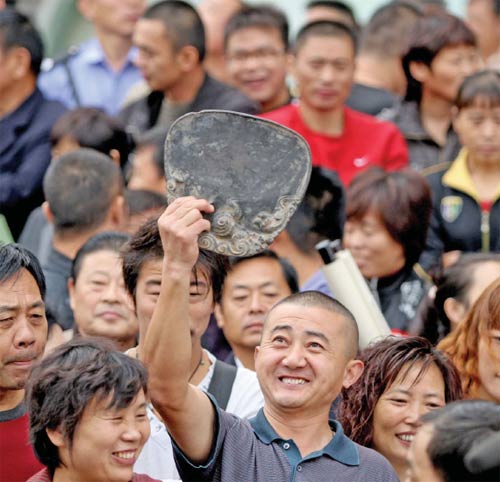Society
Finding the true value
Updated: 2011-05-27 11:01
By Zhang Yuchen (China Daily European Weekly)
|
|
Who is qualified?
Investing in antiques, like investing in real estate, has swept the country in the past 10 years as a means of accumulating wealth. But it works only if the investment is well placed. That requires expert appraisal, which can be hard to find.
In China, the people who are consulted to appraise antiques generally fall into four groups: museum researchers who have been absorbed in their fields for decades, other employees of well-regarded museums, professors in archeology academies and commercial appraisers.
Song Zhaolin, a researcher at the National Museum of China, puts his faith only in the first group, his own. Through his experience in research, he values the years of familiarity with genuine collections.
A 70-year-old who researched and repaired relics for years at different museums cautioned that working for a museum doesn't necessarily qualify people for appraisals. "They may brag they are working in a famous place, but their real job responsibilities may only cover repairing the plumbing," says the man, who would not let his name be used.
Archeology professors are well trained to recognize and safeguard ancient relics, but may not be familiar with the current market or setting monetary values.
China's Cultural Market Development Center used to provide consultations on antiques, but in April it canceled all appraisal services for individual collectors. It gave no explanation.
The China Association of Collectors connects people who share an interest in collecting, but it does not provide appraisal services to the public, an association officer says.
Local cultural departments make judgments about items in terms of how they can be shipped abroad, but that is only for customs purposes.
Some antique auction firms have their own appraisers or hire specialists they are familiar with to judge whether items are genuine. In that sense they are not independent appraisers, but the works they are valuing generally are intended for sale at auction. These specialists may or may not also evaluate items for individuals.
Yang Ziming, the principal appraiser at Ji Gu Relics Evaluation Center in the Liulichang Cultural Relics Street, charges 50 to 100 yuan for an oral evaluation, a lower rate than others posted at nearby shops. He says he can help a customer find appraisers with much more experience and fees to match, about 20,000 yuan.
Down the street, Wang Yunrong, an appraiser at Beijing Aoya Technological and Trade Co, says he can verify the genuineness of jade, Chinese water paintings, porcelains, coins and other items. So can the other two appraisers he works with, he says.
When asked about his qualifications, Wang says that he was called upon to confiscate antiques from the rich during the "four cleansings" campaign in the 1960s.
In his shop, he says: "Every one of us has abundant knowledge about all fields."
Song, the National Museum researcher, views expertise differently. A true expert has general knowledge about many spheres of his field, he says, but specializes in just one or two.
"The number of real experts gets smaller nowadays as the old generation of appraisers pass away and the younger one has not yet grown up," Song says.
Specials

Room at the inn
The Chinese hotel industry experiences a building boom, prompting fears of oversupply.

Pearls of wisdom
Chinese pearl farmers dominate the world market but now want to work smarter, not harder

Truly a super woman
Li Yuchun first came to prominence in 2005 as the Super Girl winner, and since then has become an international star.
